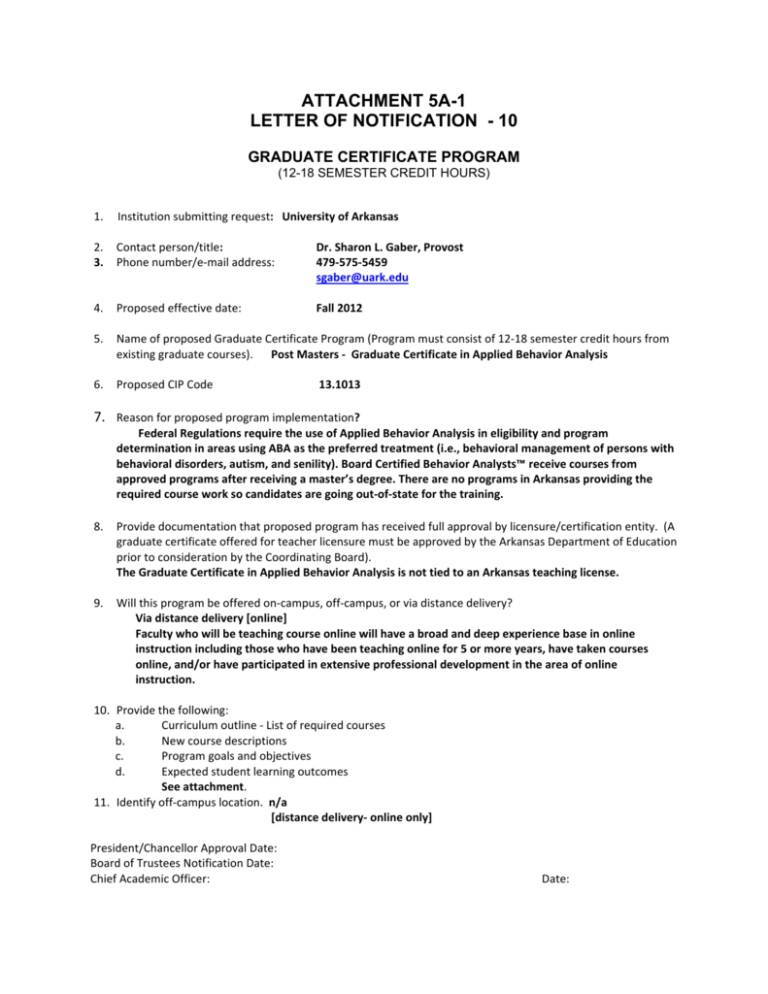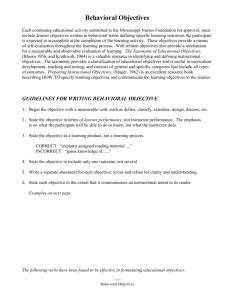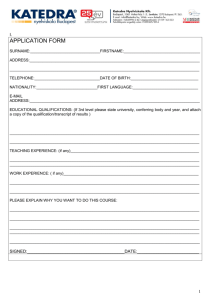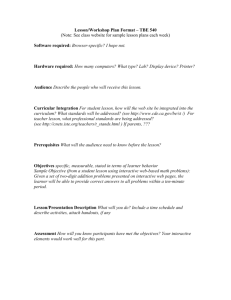5A-1 - Faculty Senate - University of Arkansas
advertisement

ATTACHMENT 5A-1 LETTER OF NOTIFICATION - 10 GRADUATE CERTIFICATE PROGRAM (12-18 SEMESTER CREDIT HOURS) 1. Institution submitting request: University of Arkansas 2. Contact person/title: Dr. Sharon L. Gaber, Provost 3. Phone number/e-­‐mail address: 479-­‐575-­‐5459 sgaber@uark.edu 4. Proposed effective date: Fall 2012 5. Name of proposed Graduate Certificate Program (Program must consist of 12-­‐18 semester credit hours from existing graduate courses). Post Masters -­‐ Graduate Certificate in Applied Behavior Analysis 6. Proposed CIP Code 13.1013 7. Reason for proposed program implementation? Federal Regulations require the use of Applied Behavior Analysis in eligibility and program determination in areas using ABA as the preferred treatment (i.e., behavioral management of persons with behavioral disorders, autism, and senility). Board Certified Behavior Analysts™ receive courses from approved programs after receiving a master’s degree. There are no programs in Arkansas providing the required course work so candidates are going out-­‐of-­‐state for the training. 8. 9. Provide documentation that proposed program has received full approval by licensure/certification entity. (A graduate certificate offered for teacher licensure must be approved by the Arkansas Department of Education prior to consideration by the Coordinating Board). The Graduate Certificate in Applied Behavior Analysis is not tied to an Arkansas teaching license. Will this program be offered on-­‐campus, off-­‐campus, or via distance delivery? Via distance delivery [online] Faculty who will be teaching course online will have a broad and deep experience base in online instruction including those who have been teaching online for 5 or more years, have taken courses online, and/or have participated in extensive professional development in the area of online instruction. 10. Provide the following: a. Curriculum outline -­‐ List of required courses b. New course descriptions c. Program goals and objectives d. Expected student learning outcomes See attachment. 11. Identify off-­‐campus location. n/a [distance delivery-­‐ online only] President/Chancellor Approval Date: Board of Trustees Notification Date: Chief Academic Officer: Date: Response to item 10. Curriculum Outline Program of Study CIED 6843 Basic Principles of ABA CIED 6853 Assessment in ABA CIED 6863 Behavioral Change Procedures and Supports CIED 6873 Measurement and Experimental Design CIED 6883 Ethical, Professional, and Legal Standards CIED 6843 Basic Principles of ABA (FA) Course provides information on: (a) the philosophical assumptions and principles of behavior analysis; (b) basic principles, processes, and concepts of applied behavior analysis; and (c) ethical and legal issues involved in its use. Program goals To know and understand the (a) definition and characteristics, (b) principles, processes, and concepts, and (c) the ethical and legal considerations in the use of Applied Behavior Analysis Program objectives To know the philosophy, theory, and principles of Applied Behavior Analysis To know and understand the basic terminology, principles, processes, and concepts of applied behavior analysis To understand the ethical and legal issues in the use of Applied Behavior Analysis Expected learner outcomes The learner will define and describe the characteristics of Applied Behavior Analysis. The learner will define and demonstrate knowledge of the principles, processes, and concepts of Applied Behavior Analysis. The learner will describe ethical and legal issues involved in the use of Applied Behavior Analysis. CIED 6853 Behavioral Assessment in ABA (FA) Course content includes information on effective methods and the development of skills in: (a) assessing, organizing, and interpreting behavior; (b) conducting task analysis and selecting intervention goals and strategies; (c) displaying data; and (d) making evidence-­‐based decisions. Legal and ethical standards will be reviewed and applied to behavioral change procedures used. Program goals To demonstrate knowledge and skills in behavioral assessment and its use in developing effective behavioral change procedures Program objectives To demonstrate skills in assessing, organizing, and interpreting behavior To demonstrate skills in conducting task analysis and selecting intervention goals and strategies To demonstrate skills in organizing and using data to make evidenced based decisions To demonstrate knowledge of the ethical and legal standards in the use of Applied Behavior Analysis Expected learner outcomes The learner will conduct and interpret behavioral assessments including a functional analysis of behavior and task analysis The learner will use assessment data to design goals and strategies in behavioral change programs The learner will collect and display data for use in data-­‐based decisions The learner will make evidenced–based decisions The learner will make decisions based on ethical, professional and legal standards. CIED 6863 Behavioral Change Procedures and Support (SP) Course content includes (a) information on behavior change procedures; (b) activities designed to acquire skill in developing and evaluating behavioral change programs; and (c) information and activities designed to acquire skills in providing and monitoring persons and systems providing support. Legal and ethical standards will be reviewed and applied to the course content. Program goals To demonstrate knowledge and skills in applying behavior change procedures and systems support in behavior change programs. Program objectives To know and understand behavioral change process To understand behavior change procedures and its evaluation To design, monitor, and evaluate behavior change programs To know and understand the use of systems support in behavior change programs To demonstrate knowledge of the ethical and legal standards in behavior change programming Expected learner outcomes The learner will use behavior-­‐based strategies to design behavior change programs. The learner will design, monitor, and evaluate behavior change programs. The learner will identify and use systems support in behavior change programs. The learner will make decisions based on ethical, professional and legal standards. CIED 6873 Measurement and Experimental Design (SP) Course content includes information on and the development of skills in: (a) the measurement of the multiple dimensions of behaviors; (b) the use of methods of measuring behavior; (c) the experimental evaluation of interventions; and (d) the multiple methods of displaying and interpreting behavioral data. Legal and ethical standards will be reviewed and applied to the course content. Program goals To know, understand, and demonstrate the ability methods of collecting, displaying, and interpreting, and utilizing behavioral data in the decision-­‐making process. Program objectives To understand how measure and collect data on the various dimensions of behavior To design, collect, and display behavioral data To understand and demonstrate skills in scheduling and collecting data using time sampling To know and understand the use of single case methodology as an experimental design for use with in behavioral change procedures Expected learner outcomes The learner will demonstrate the multiple methods of displaying and interpreting behavioral data. The learner will design, collect, and display behavioral data. The learner will design and implement an experimental methodology for evaluating a behavior change program. The learner will make decisions based on ethical, professional and legal standards. CIED 6883 Ethical, Professional, and Legal Standards (FA) Course content includes information on the ethical, professional and legal standards in the profession of applied behavior analysis and practice in its use. Program goals To know, understand, and demonstrate the ability to make decisions based on ethical, professional and legal standards in the profession of applied behavior analysis. Program objectives To demonstrate decision-­‐making behaviors based on the ethical, professional and legal standards in the profession of applied behavior analysis. To work within one’s competency in the profession of applied behavior analysis Expected student learner outcomes The learner will protect client’s confidentiality within the professional role. The learner will ensure that the client’s dignity, heath, and safety are protected at all times. The learner will seek assistance when the client’s needs extend beyond the limits of personal competency.







